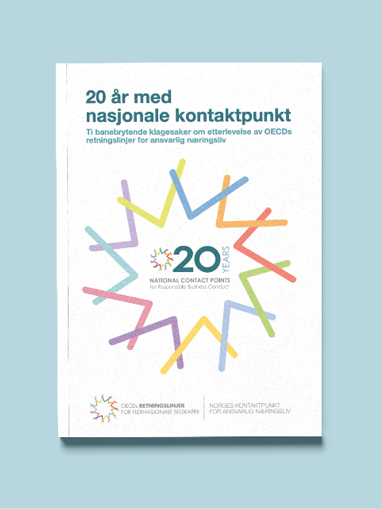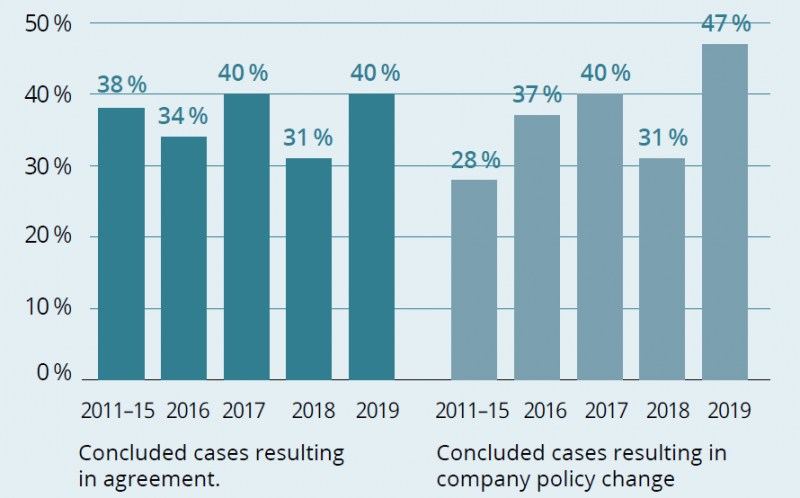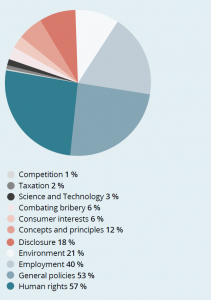Handling of specific instances
The OECD National Contact Point system gives individuals, local communities and organisations a grievance mechanism when they believe that multinational enterprises have had a negative impact on people, society or the environment. This makes the OECD Guidelines for Multinational Enterprises unique. No other international instruments have a corresponding grievance mechanism.
Norway’s NCP handles complaints against Norwegian multinational enterprises concerning allegations of non-compliance with the OECD Guidelines.
Groundbreaking climate change complaint
The first ever complaint relating to climate change handled by a National Contact Point gave unprecedented results: Commercial banks such as ING must put effort into defining concrete targets and managing their lending portfolios in line with the Paris Agreement.
Text: Marianne Alfsen, Felix Media.
In November 2017, the Dutch National Contact Point (NCP) accepted a complaint lodged by Greenpeace Netherlands, Oxfam Novib, BankTrack and Milieudefensie. The four NGOs claimed that continued investments in fossil fuels by ING were in violation of the OECD Guidelines.
For an international bank with 57,000 employees in 40 countries, priding itself on taking the lead on climate change, the complaint came as an unpleasant surprise.
‘Our initial reaction was that the complaint was not fair,’ recalls Arnaud Cohen Stuart, Head of Business Ethics at ING.
However, as the process began, a remarkable partnership formed and the final outcome was a leap forward for the Paris Agreement from 2015.


The essence of the case
The NGOs claimed that ING ‘was falling seriously short‘ in working towards the Paris Agreement, where states agreed to keep global warming below 2 degrees Celsius, with an ambition to keep it below 1.5 degrees.
The NGOs wanted ING to define a methodology to measure indirect emissions, publish its carbon footprint and set targets for reductions in line with the 1.5 degree goal – in other words, to steer its lending portfolio to align with the Paris Agreement’s most ambitious goal.
‘But that was impossible, as there was no methodology nor data to measure indirect emissions from our lending portfolio. No one could do it,’ says Cohen Stuart
No more coal
The issue had already been on ING’s radar for some time. Since 2015, ING has been working with outside parties to develop a methodology to measure and manage the impact of its lending portfolio. In the run-up to the United Nations Climate Change Conference in 2015 (COP21), in order to convey its commitment to being part of the solution in Paris, ING announced it would no longer take on new thermal coal ventures. Two years later, ING upped the ante, actively phasing out thermal coal from their portfolio.
‘The financial industry has no formal role in the Paris Agreement, as it only targets governments. However, as part of the value chain we do have a role to play,’ underlines Cohen Stuart.
A positive process
‘The questions asked by the NGOs were fair to discuss. And indeed we had been discussing with the NGOs the importance of measuring the climate impact of our lending portfolio and our efforts to find a way to do that accurately. We were therefore surprised that the complaint was notified to the NCP,’ says Pim Brouwer, Legal Counsel at ING.
When the NCP offered to facilitate a dialogue, it was never an option to decline to participate in the process.
‘As a bank, we are committed to the OECD Guidelines, and we respect the institution of National Contact Points,’ Cohen Stuart emphasises.
The initial response was soon replaced by a more constructive approach:
‘Emotions do not fuel good discussions, so we decided to consider this an opportunity,’ adds Brouwer.
The ING representatives felt they were given room to make their case, explain the realities of the situation and document their commitment to contribute to the Paris Agreement goals. A commitment that was recognised in the final statement by the NCP.
‘We were allowed to bring in external experts that we could sharpen our thinking with,’ says Brouwer.
According to Brouwer, the attitude at the table quickly turned from adversarial into one that enabled all parties to focus on a common interest in finding solutions.
A new scenario
‘It is never a bad thing to spend time together and talk. We developed a mutual understanding of what was feasible or not, and better insight into how the NGOs think,’ Cohen Stuart says.
Parallel to the NCP process, ING continued its hunt for a methodology. Progress was made. However, every methodology needs data. Since the International Energy Agency (IEA) only publishes scenarios based on the well below 2 degrees goal, there is no data for the 1.5 degrees goal.
‘So, we asked ourselves: Why not lobby jointly,’ says Cohen Stuart.
‘It is never a bad thing to spend time together and talk.‘
Arnaud Cohen Stuart
And that was one of the unprecedented outcomes of the process; the NGOs and ING jointly lobbied the Dutch government to ask the IEA to develop the necessary scenarios.
In the spring of 2021, the IEA is expected to publish a 1.5 degree scenario.
‘Who knows if indeed our joint effort with the NGOs did trigger the latest developments,’ Cohen Stuart says, adding that their request was part of a chorus pushing the same agenda.
The final NCP statement was published in April 2019. Since then, other banks have joined the open source methodology called PACTA, developed by ING and 2˚Investing Initiative (2dii).
‘By making the methodology open source, we hope to help and inspire other banks to use PACTA and contribute further to its development,’ according to Cohen Stuart and Brouwer.
Complaints from a to z
The OECD gives individuals, local communities and organisations a place to turn to when they are concerned about how multinational enterprises are affecting people, society and the environment. In 2020, the NCP handled five specific instances.
Non-judicial system
The grievance mechanism is non-judicial, but the NCP relies on key legal concepts such as the adversarial principle and documentation requirements when handling specific instances.



 The collection was launched on 14 December 2020 to mark the 20th anniversary of the OECD National Contact Points’ system. The compendium contains specific instances handled by different NCPs.
The collection was launched on 14 December 2020 to mark the 20th anniversary of the OECD National Contact Points’ system. The compendium contains specific instances handled by different NCPs.

